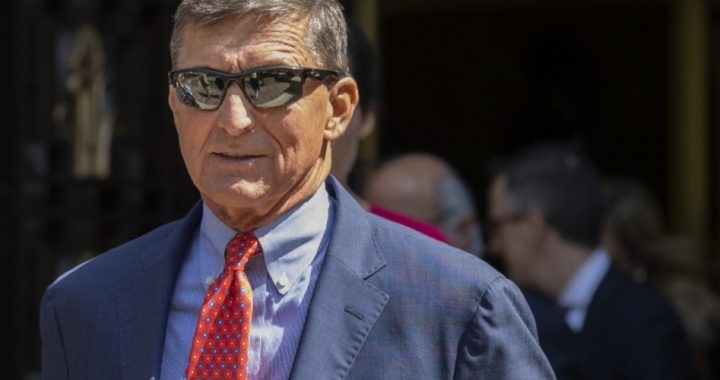
NBC News said on Tuesday that the move by U.S. District Judge Emmet Sullivan to continue the government’s case against General Michael Flynn and to continue the case by appointing a liberal retired judge as a “friend of the court” in continuing the prosecution of Flynn was “unprecedented.” Now, Flynn is asking a federal appeals court to order Judge Sullivan to dismiss the case.
On May 7, the Department of Justice moved to dismiss its case against Flynn based on new evidence that he had been set up by the FBI. In its filing, the DOJ said, “In the government’s assessment … continued prosecution of the charged crime does not serve a substantial federal interest. The government respectfully moves to dismiss the criminal information … against Mr. Flynn.”
Upon hearing the news, Flynn’s attorney, Sydney Powell, was delighted: “This is a restoration of the rule of law.”
Her celebration turned out to be premature. The judge’s acceptance of the government’s request was expected to be automatic. It wasn’t. Instead, as The New American reported, the judge decided to keep the case open and accept “friend of the court” briefs from people who want the prosecution of Flynn to continue.
First up were 16 former Watergate prosecutors who wanted to weigh in on the matter. Powell responded:
The “Watergate Prosecutors” have no special role and no authority whatsoever to insert themselves in this litigation on behalf of anyone. They are no different than all those whose requests and attempts this court has quickly and resoundingly denied….
A criminal case is a dispute between the United States and a criminal defendant. There is no place for third parties to meddle in the dispute, and certainly not to usurp the role of the government’s counsel. For the Court to allow another to stand in the place of the government would be a violation of the separation of powers.
Retired U.S. District Judge John Gleeson, appointed by President Bill Clinton to that position in 1994, weighed in on the matter, claiming that Sullivan’s move was proper. He co-authored an opinion piece for the Washington Post in which he declared, “The Justice Department’s move to dismiss the prosecution of former national security advisor Michael Flynn does not need to be the end of the case — and it shouldn’t be.… Sullivan … has the authority, the tools and the obligation to assess the credibility of the department’s stated reasons for abruptly reversing course.”
Gleeson went on to say, “There has been nothing regular about the department’s effort to dismiss the Flynn case. The record reeks of improper political influence. Hours after the career prosecutor abruptly withdrew, the department moved to dismiss the indictment in a filing signed only by an interim U.S. attorney, a former aide to Attorney General William P. Barr whom Barr had installed in the position months before.”
He added that Sullivan has many tools to continue the prosecution against Flynn. He “can appoint an independent attorney to act as a ‘friend of the court,’ ensuring a full adversarial inquiry.”
Two days later, Sullivan invited Gleeson to act as that “friend of the court” to continue the prosecution against Flynn.
In her 44-page emergency writ of mandamus (a “demand”) issued on Tuesday, Powell pointed out to the D.C. Circuit Court of Appeals that in 2013 Gleeson himself had held that “the government has near-absolute power under the Federal Rules of Criminal Procedure to extinguish a case that it has brought.” But now Gleeson has reversed himself in pushing to continue the case against Flynn.
Powell excoriated Sullivan in her demand to the higher court:
The district judge’s latest actions — failing to grant the Government’s Motion to Dismiss, appointing a biased and highly-political amicus who has expressed hostility and disdain towards the Justice Department’s decision to dismiss the prosecution, and the promise to set a briefing schedule for widespread amicus participation in further proceedings — bespeaks a judge who is not only biased against Petitioner, but also revels in the notoriety he has created by failing to take the simple step of granting a motion he has no authority to deny.
This is an umpire who has decided to steal public attention from the players and focus it on himself. He wants to pitch, bat, run bases, and play shortstop. In truth, he is way out in left field.
The appeals court now has the opportunity to end the madness, exonerate Flynn, and give him his life back.
Photo: AP Images
An Ivy League graduate and former investment advisor, Bob is a regular contributor to The New American, writing primarily on economics and politics. He can be reached at [email protected].
Related articles:
Judge in Michael Flynn Case to Reopen Arguments
Obama: “Rule of Law Is at Risk” After DOJ Drops Flynn Case
Justice Department Moves To Dismiss Case Against General Flynn



